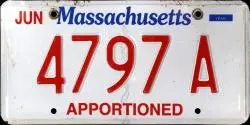Apportioned Plates (IRP) Massachusetts

The International Registration Plan (IRP) is an agreement between U.S. states, the District of Columbia, and Canadian provinces that enables commercial vehicles to travel across multiple regions with just one registration. Instead of registering separately in every state or province, carriers pay fees proportionally based on the miles they drive in each area -a process known as apportionment.
By using IRP apportioned plates, commercial vehicles can legally operate in various states or provinces while being registered only in their home jurisdiction. This system simplifies interstate compliance for businesses and ensures that registration fees are fairly distributed among all jurisdictions where the vehicle travels.

Who Needs IRP Apportioned Plates in Massachusetts?
In Massachusetts, a vehicle is required to have IRP registration if it meets one or more of the following criteria:
- It has a gross vehicle weight (GVW) over 26,000 pounds.
- It is a power unit with three or more axles, regardless of weight.
- It is used for interstate commerce, meaning it travels across state or national borders for business.
Examples of vehicles and operations that typically require IRP plates include long-haul trucking companies transporting goods between states, owner-operators with heavy-duty tractors making deliveries in multiple regions, and private carriers hauling equipment across New England for commercial use. Even if you occasionally cross state lines, you may still be required to register under IRP if your vehicle meets the weight or axle thresholds.
Massachusetts IRP Registration Process
The Massachusetts Registry of Motor Vehicles (RMV) is responsible for handling IRP registrations. To get started, the carrier must confirm that Massachusetts is their base jurisdiction. This means the business must be physically located in Massachusetts, must maintain operational records here, and must travel through multiple IRP member jurisdictions.
Once this is established, the applicant must fill out the Massachusetts IRP Application. This form requires the applicant to list all the states and provinces where the vehicle will travel, estimate the number of miles to be driven in each jurisdiction, and declare the gross vehicle weight for each.
Along with the application, several documents must be submitted. These include proof of business location, a federal employer identification number (FEIN), the title or certificate of origin for each vehicle, proof of heavy vehicle use tax payment (IRS Form 2290), proof of insurance, and safety carrier information.
Completed applications and supporting documents can be submitted by mail to the RMV IRP department in Quincy, or in person at designated RMV service centers that process IRP transactions.
Fees and Renewal Schedule for IRP Plates
IRP fees are calculated using a combination of the vehicle’s gross weight and the percentage of miles traveled in each state or province. For example, if a vehicle drives 70 percent of its total miles in Massachusetts and 30 percent in Connecticut, the registration fee will be divided accordingly between the two jurisdictions.
The total fee varies depending on the number of jurisdictions, weight category, and distance traveled, but it typically ranges between $1,500 and $2,500 per year for a single power unit. Some carriers operating in many jurisdictions or with heavier vehicles may pay significantly more.
Massachusetts apportioned plates must be renewed annually. Carriers are assigned a renewal month, and the RMV sends out reminders in advance. Renewal requires the carrier to update mileage and jurisdiction data, verify vehicle information, and submit payment for the upcoming year. Renewals can be completed online through the IRP Portal, in person, or by mail.
Do I Need IFTA with My IRP Plate?
Most carriers who qualify for IRP are also required to register for the International Fuel Tax Agreement, or IFTA. This agreement simplifies the reporting of fuel taxes for vehicles that operate in more than one jurisdiction.
IFTA registration is required for vehicles that travel across state lines, have a GVW over 26,000 pounds, or have three or more axles. Like IRP, IFTA ensures that fuel taxes are fairly distributed based on where fuel is used, not just where it’s purchased. IFTA and IRP are separate programs but are closely related and often apply to the same vehicles.
Get Help with IRP Registration in Massachusetts
Navigating IRP registration can be complicated and time-consuming, especially for first-time applicants or carriers operating in multiple jurisdictions.That’s why many businesses trust us to handle their IRP registration from start to finish.
Our expert team will help you determine your eligibility, collect all the necessary documents, accurately calculate your fees, and submit your application promptly to avoid any delays. We also provide ongoing support for renewals and any updates you need to make to your IRP account.
If you need professional assistance with IRP registration in Massachusetts, contact us today at (888) 202-4927 . Let our experienced specialists simplify the process for you.
